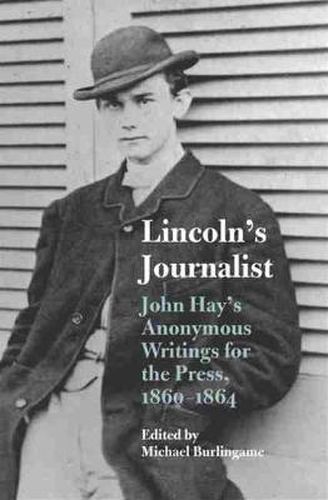Readings Newsletter
Become a Readings Member to make your shopping experience even easier.
Sign in or sign up for free!
You’re not far away from qualifying for FREE standard shipping within Australia
You’ve qualified for FREE standard shipping within Australia
The cart is loading…






In the Civil War White House, John Hay became the ultimate insider, the man who had the president’s ear.
Only an extremely small number of persons ever saw Abraham Lincoln both day and night in public as well as private settings from 1860 to 1864,
notes Wayne C. Temple, chief deputy director, Illinois State Archives.
And only one of them had the literary flair of John Milton Hay.
The most privileged of reporters, Hay sent out dispatches and editorials that shed direct as well as indirect light on Lincoln. With ample access to the president, Hay was in a position to report his words and deeds as well as to offer opinions that may have reflected Lincoln’s own views. Indeed, Burlingame suggests that Lincoln influenced Hay to write and place the articles in northern newspapers. Burlingame takes great pains to establish authorship of the items reproduced here. He convincingly demonstrates that the essays and letters written for the
Providence
Journal, the
Springfield Illinois State
Journal, and the
St. Louis Missouri Democrat
under the pseudonym
Ecarte
are the work of Hay. Additionally he finds much circumstantial and stylistic evidence that Hay wrote as
our special correspondent
for the
Washington World
and for the
St. Louis Missouri Republican . Easily identifiable, Hay’s style was
marked by long sentences, baroque syntactical architecture, immense vocabulary, verbal pyrotechnics, cocksure tone (combining acid contempt and extravagant praise), offbeat adverbs, and scornful adjectives.
$9.00 standard shipping within Australia
FREE standard shipping within Australia for orders over $100.00
Express & International shipping calculated at checkout
In the Civil War White House, John Hay became the ultimate insider, the man who had the president’s ear.
Only an extremely small number of persons ever saw Abraham Lincoln both day and night in public as well as private settings from 1860 to 1864,
notes Wayne C. Temple, chief deputy director, Illinois State Archives.
And only one of them had the literary flair of John Milton Hay.
The most privileged of reporters, Hay sent out dispatches and editorials that shed direct as well as indirect light on Lincoln. With ample access to the president, Hay was in a position to report his words and deeds as well as to offer opinions that may have reflected Lincoln’s own views. Indeed, Burlingame suggests that Lincoln influenced Hay to write and place the articles in northern newspapers. Burlingame takes great pains to establish authorship of the items reproduced here. He convincingly demonstrates that the essays and letters written for the
Providence
Journal, the
Springfield Illinois State
Journal, and the
St. Louis Missouri Democrat
under the pseudonym
Ecarte
are the work of Hay. Additionally he finds much circumstantial and stylistic evidence that Hay wrote as
our special correspondent
for the
Washington World
and for the
St. Louis Missouri Republican . Easily identifiable, Hay’s style was
marked by long sentences, baroque syntactical architecture, immense vocabulary, verbal pyrotechnics, cocksure tone (combining acid contempt and extravagant praise), offbeat adverbs, and scornful adjectives.